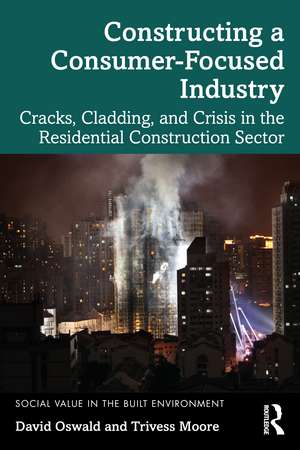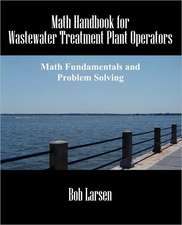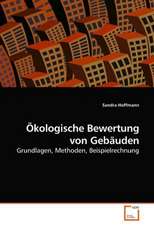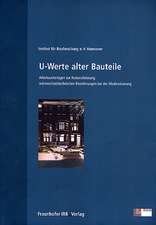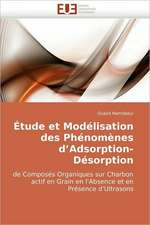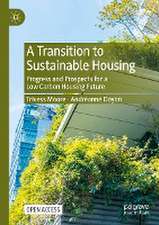Constructing a Consumer-Focused Industry: Cracks, Cladding and Crisis in the Residential Construction Sector: Social Value in the Built Environment
Autor David Oswald, Trivess Mooreen Limba Engleză Paperback – 10 iun 2022
Too often there has been a lack of government and industry support to help the housing consumer through these issues or to prevent them from occurring to begin with. It is time for a rethink and restructure of government policy, support, and industry practices to better protect housing consumers and deliver high-quality and sustainable housing that creates social value.
Through evidence-based research and international case studies, this book focuses on the effects that dangerous defects have on the housing consumer. The ongoing construction cladding crisis is used as a primary case study throughout to highlight these implications, with other previous large-scale defect examples, such as leaky buildings and asbestos. Based upon the range of emerging evidence, we propose ideas for policy makers, construction and built environment professionals, owners corporations, and households on how to move forward towards a higher-quality, sustainable, and socially valuable way of residential living.
Government policy has long focused on ‘making industry work’ through building regulations and standards. It is now time for greater government and industry focus on the consumer to make ‘consumer protection work’ in the built environment. There is a need to prevent dangerous defects like combustible cladding, better support consumers when defects emerge, and to create buildings for social value rather than minimum standards. Now is the time to build a better future for the end-user.
| Toate formatele și edițiile | Preț | Express |
|---|---|---|
| Paperback (1) | 469.34 lei 6-8 săpt. | |
| CRC Press – 10 iun 2022 | 469.34 lei 6-8 săpt. | |
| Hardback (1) | 1109.18 lei 6-8 săpt. | |
| CRC Press – 10 iun 2022 | 1109.18 lei 6-8 săpt. |
Preț: 469.34 lei
Nou
Puncte Express: 704
Preț estimativ în valută:
89.81€ • 93.77$ • 74.33£
89.81€ • 93.77$ • 74.33£
Carte tipărită la comandă
Livrare economică 04-18 aprilie
Preluare comenzi: 021 569.72.76
Specificații
ISBN-13: 9781032007311
ISBN-10: 1032007311
Pagini: 184
Ilustrații: 4 Tables, black and white; 2 Line drawings, black and white; 2 Illustrations, black and white
Dimensiuni: 156 x 234 x 10 mm
Greutate: 0.45 kg
Ediția:1
Editura: CRC Press
Colecția Routledge
Seria Social Value in the Built Environment
ISBN-10: 1032007311
Pagini: 184
Ilustrații: 4 Tables, black and white; 2 Line drawings, black and white; 2 Illustrations, black and white
Dimensiuni: 156 x 234 x 10 mm
Greutate: 0.45 kg
Ediția:1
Editura: CRC Press
Colecția Routledge
Seria Social Value in the Built Environment
Public țintă
Academic, Postgraduate, Professional, and Professional Practice & DevelopmentNotă biografică
Dr. David Oswald is a Senior Lecturer and Deputy Program Manager in the School of Property, Construction and Project Management at RMIT University in Australia. He is a journal editor, reviewer, and PhD examiner and has written multiple award-winning academic publications within construction and the built environment. His recent combustible cladding research with Dr. Moore was used in Victorian parliament (Australia) to demonstrate the need for improving homeowner consumer protection.
Dr. Trivess Moore is a Senior Lecturer in the School of Property, Construction and Project Management at RMIT University in Australia. His research relates to housing quality and performance and focuses on the intersection between technical performance, liveability, social impact, and policy. In addition to recent work with Dr. Oswald on combustible cladding, he has been undertaking research looking at retrofit and the circular economy in Australia.
Dr. Trivess Moore is a Senior Lecturer in the School of Property, Construction and Project Management at RMIT University in Australia. His research relates to housing quality and performance and focuses on the intersection between technical performance, liveability, social impact, and policy. In addition to recent work with Dr. Oswald on combustible cladding, he has been undertaking research looking at retrofit and the circular economy in Australia.
Cuprins
1. Cracks, cladding and crisis in the residential sector, 2. Building defects: considering the human cost, 3. Homeowner vulnerability: dangerous defects, 4. The real cost? Well-being implications for the consumer, 5. Corporate social responsibility for the consumer, 6. Dealing with dangerous defects in multiple occupancy developments, 7. Navigating landlord-tenant conflicts, 8. Government support during times of crisis, 9. Designing and building better for the housing consumer, 10. Conclusions
Recenzii
"The implications of this book are profound. The authors argue for strengthening consumer protection. From my perspective, dangerous defects arise from poor regulation or poor exercise of regulated powers on industry practices, design and materials. This rich and challenging research by Oswald and Moore demonstrates the need to build well and the wider consequences of not doing so. The book deserves to be read and discussed widely within industry, government, and civil society. It can help to initiate change by understanding the social and economic costs to society of dangerous defects. The nature of these changes implies a radical rethink is needed: clarity on oversight and monitoring, responsibilities, regulation, enforcement, and recourse/resolution when things go wrong." Kay Saville-Smith (CRESA, Aotearoa NZ) in Buildings & Cities Journal
Descriere
Through evidence-based research and international case studies, this book focuses on the effects that dangerous defects have on the housing consumer.
